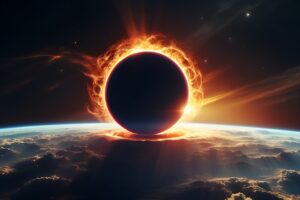
Jewish tradition considers an eclipse to be a bad omen. But it should be seen as an occasion for a blessing.
We are on a fantastic journey, over which we have precious little control. As our universe expands, we are pushed deeper and deeper into space. We travel along, like some pebble carried with the tide. Our own galaxy, like hundreds of millions of others, rotates, and it does so at about 168 miles per second. On one of the spiral arms of our galaxy, our solar system has its own rhythms. Within the solar system, our home planet goes around our local star, the Sun, and our moon orbits around our home planet, even as the Earth and the Moon spin too.
Once in a while, in the midst of all this motion, the Moon travels between the Earth and the Sun in such a way as to block the light of the Sun from reaching us. It casts a shadow on our planet. The blockage may be partial or complete. We call this event a solar eclipse. In a total eclipse, when the Moon obscures the entire solar disk, the fullest form of the Moon’s shadow, the umbra, lasts no more than a few minutes in any one spot, but the effects are stark as darkness literally covers the Earth and the temperature drops.
We will ooh and ah as the eclipse begins, but we know that this too shall pass. All that was will be again and soon. Normalcy will return. One might think that it would be an occasion for a blessing, a b’rakhah. After all, Jews seemingly have blessings, or b’rakhot, for every event and circumstance, from the sublime to the mundane, and from the time they arise to the time they go to sleep. And there are well recognized blessings for similar occurrences. For instance, when one sees a comet or lightening, there is Barukh atah Adonai, Eloheynu melekh ha’olam, oseh ma’aseh v’reyshit (Blessed is the Eternal One, Sovereign of the universe, maker of the works of creation). When one sees something beautiful like a tree or an animal, one might say Barukh atah Adonai, Eloheynu melekh ha’olam, she’kakhah lo b’olamo (Blessed is the Source of wonder, Ruler of the cosmos, that such things are in the world). There are blessings on reaching the ocean, on smelling fragrant grasses and spices, even on witnessing an earthquake. But traditionally, there is no blessing for an eclipse.
Jewish tradition, from Philo to the TalmudThe rabbinic compendium of lore and legend composed between 200 and 500 CE. Study of the Talmud is the focus of rabbinic scholarship. The Talmud has two versions, the main Babylonian version (Bavli) and the smaller Jerusalem version (Yerushalmi). It is written in Rabbinic Hebrew and Aramaic. to hasidic literature, generally has held that an eclipse is a bad omen for the world. However, this approach is also inconsistent with the traditional practice of offering blessings, for more frequent, often more terrifying and clearly more dangerous events. After all, a total eclipse of the Sun is no less impressive than is lightening or an earthquake. And, further, this approach runs counter to the long standing tradition expressed in the Talmud (Menachot 43b) which calls on us to recite b’rakhot frequently during our waking hours, even to the extent of one hundred a day. On the day of a solar eclipse, we should focus on ninety-nine other things and not note that the disk of the Sun is being obscured?
Even more importantly, the preclusion of a b’rakhah regarding an eclipse undermines the emotional and intellectual benefit of a blessing, a principal purpose of which is to raise the level of consciousness of the person saying it. The words give literal expression to the remarkable thing or event which the individual’s senses have encountered or soon will. A blessing, then, is an empowering act, and to deny an individual, any individual, the opportunity to acknowledge, realize, concentrate, appreciate, and grow can only limit a person’s mind and spirit, stunting his or her humanity.
As modern Jews, we can and should appreciate the order in the cosmos, especially the regularity of orbits. We can and should recognize the total dependence of all life as we know it on the energy that we receive from our local star. As the umbra approaches and recedes in a total solar eclipse, we can see the light change, sense the drop in temperature. Even as it compels us to look to the sky, that sight, that feeling should unite us, and draw our attention away, if just momentarily, from the troubles on Earth.
All of this elicits awe and gratitude, two primary bases for blessings. How appropriate then, as one looks (very carefully and with appropriate equipment) upward during a solar eclipse to acknowledge one’s awe and express one’s gratitude for having reached this season and being able to observe and to feel the works of creation. Here is one way:
As the eclipse nears . . . Barukh Atah – Blessed is the Source of Life that fashioned the stars, that sends forth heat from the Sun to warm us and light from the Sun to nourish the food we eat and provide the wonderful colors that so enrich our lives.
When standing in the shadow . . . Modim Anakhnu Lakh – We are thankful for the opportunity to be reminded how fleeting and precious our time here is, how bound we are, one to the other, how much we should treasure the moments we have and the people with whom we share this most amazing planet.
As light reemerges . . . Barukh Atah – Blessed is the Sustainer of Life. May we be refreshed and renewed by the harmony of the spheres, and may our lives be worthy of the gift we have received and continue to receive through the arrangement of the cosmos.
Your words may well be different. Write them. Share them. We do need blessings now.
This post is an excerpt from one previously published at www.judaismandscience.com. Roger Price is a past president of the Federation of Reconstructionist Congregations and Havurot, one of the predecessors of The Reconstructionist Communities.
For additional ideas on how to view the eclispe Jewishly see the following:
http://jcpdowntown.org/2017/08/06/the-gift-of-reflection/






